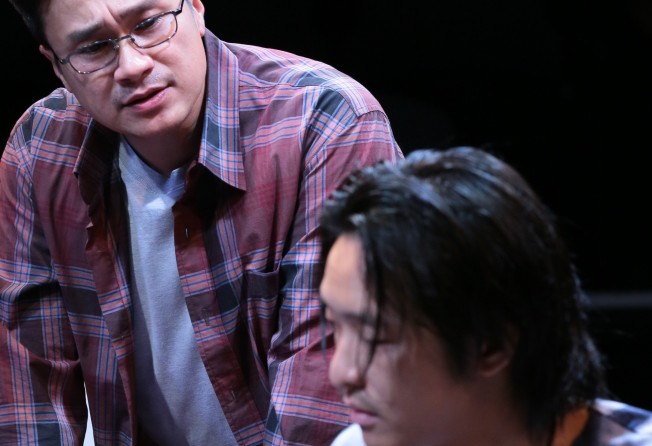Theatre review: Wolf in the House brought up to date
Revival of 1990s thriller plays down gay themes to focus on characters' psychology

Wolf in the House
Black Box Productions
Hong Kong Repertory Theatre
Until March 28
This is a new stage adaptation of London-based playwright Simon Wu’s psychological thriller that was billed, in the early 1990s, primarily as a gay play.
Homosexuality, at the time, was still considered a taboo in Hong Kong and dramas that delved explicitly into the subject were few and far between. Today, a play about one man's obsession with another barely raises an eyebrow. We live in a world where same-sex marriage is legalised in a growing number of countries in the West, and a more tolerant Hong Kong that now hosts its own gay pride events.
Aware of this shift in attitude, director Anthony Chan Kam-kuen’s take on Wolf in the House is one of suspense, focusing more on the protagonist’s psychological condition – his inability to let go of the past – than the fact he is gay.
After a road accident on a stormy Hungry Ghost Festival night, driver Ah Kai (Pichead Amornsomboon) takes the injured Ah Ming (Au Yeung Chun) home to nurse his wounds. But when Ah Ming discovers photos of what he assumes to be Ah Kai's brother, who looks exactly like himself, he begins to suspect Ah Kai's real intentions and motives.
The premise of the story sounds promising and there are several twists and turns in the plot that take the audience by surprise.
However, the drama starts abruptly. While the opening scene sets the dark tone of the piece, with Ah Kai narrating a haunting Chinese folk tale about the Hungry Ghost Festival in the dark, the next scene finds the two characters already confronting one another in a flat. Despite being total strangers, Ah Ming appears overtly hostile for no particular reason; and perhaps other than his hairstyle, not an ounce in him suggests he is from China (as he is supposed to be). It is not until the latter half of the play that the scenario becomes more convincing.
Despite this rocky start, Chan’s pacing of the play is good. Pichead's Ah Kai is riddled with grief and obsessed with memories of his deceased lover, though his portrayal of the character could be a little bit more pathological (think Annie Wilkes in Stephen King’s Misery). Au Yeung is the aloof Ah Ming and he only warms to his character in the second half of the play.
Wu’s play is multi-layered, and this Hong Kong Repertory production successfully taps into some of the layers and presents an intellectual (rather than sentimental) story that shuttles between the present and the past, reality and fantasy.